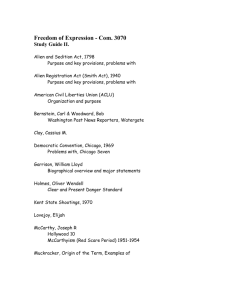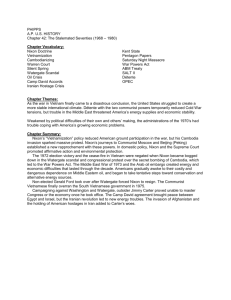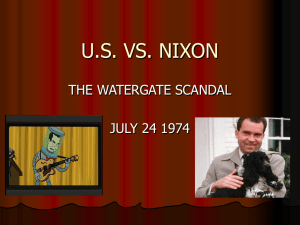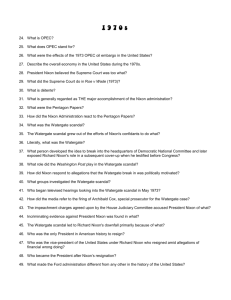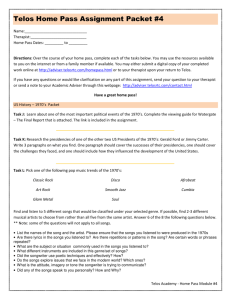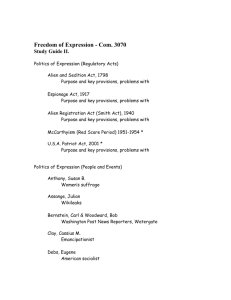Mr. Wiecker and Watergate - Shanti Jira (issue.shanti.virginia.edu)
advertisement
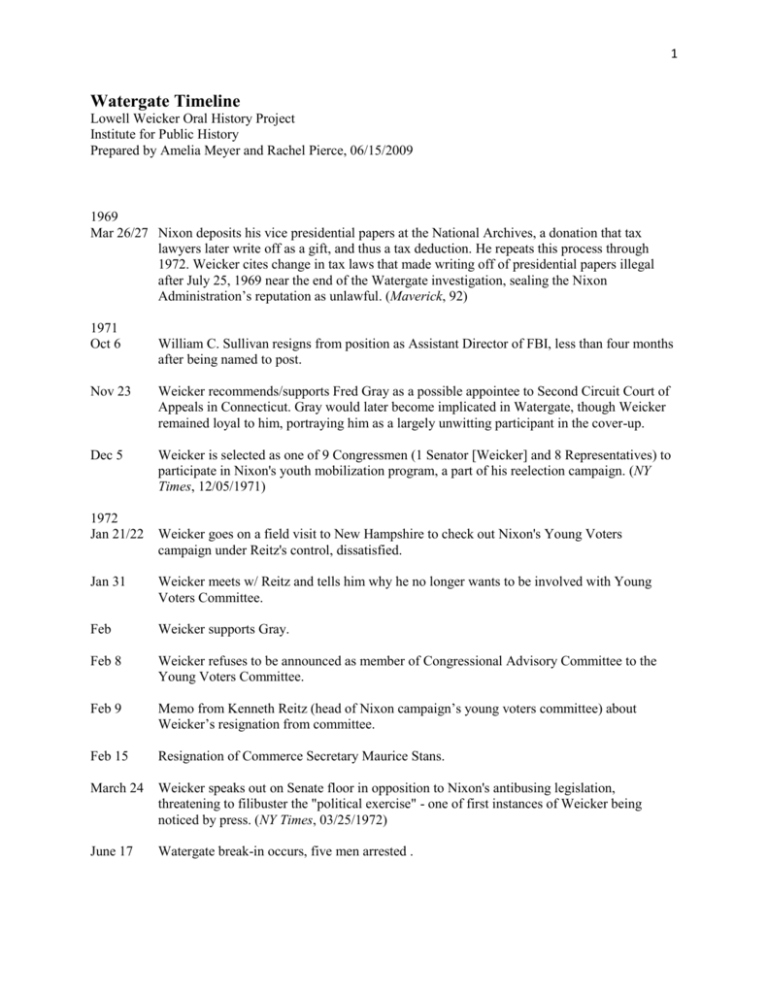
1 Watergate Timeline Lowell Weicker Oral History Project Institute for Public History Prepared by Amelia Meyer and Rachel Pierce, 06/15/2009 1969 Mar 26/27 Nixon deposits his vice presidential papers at the National Archives, a donation that tax lawyers later write off as a gift, and thus a tax deduction. He repeats this process through 1972. Weicker cites change in tax laws that made writing off of presidential papers illegal after July 25, 1969 near the end of the Watergate investigation, sealing the Nixon Administration’s reputation as unlawful. (Maverick, 92) 1971 Oct 6 William C. Sullivan resigns from position as Assistant Director of FBI, less than four months after being named to post. Nov 23 Weicker recommends/supports Fred Gray as a possible appointee to Second Circuit Court of Appeals in Connecticut. Gray would later become implicated in Watergate, though Weicker remained loyal to him, portraying him as a largely unwitting participant in the cover-up. Dec 5 Weicker is selected as one of 9 Congressmen (1 Senator [Weicker] and 8 Representatives) to participate in Nixon's youth mobilization program, a part of his reelection campaign. (NY Times, 12/05/1971) 1972 Jan 21/22 Weicker goes on a field visit to New Hampshire to check out Nixon's Young Voters campaign under Reitz's control, dissatisfied. Jan 31 Weicker meets w/ Reitz and tells him why he no longer wants to be involved with Young Voters Committee. Feb Weicker supports Gray. Feb 8 Weicker refuses to be announced as member of Congressional Advisory Committee to the Young Voters Committee. Feb 9 Memo from Kenneth Reitz (head of Nixon campaign’s young voters committee) about Weicker’s resignation from committee. Feb 15 Resignation of Commerce Secretary Maurice Stans. March 24 Weicker speaks out on Senate floor in opposition to Nixon's antibusing legislation, threatening to filibuster the "political exercise" - one of first instances of Weicker being noticed by press. (NY Times, 03/25/1972) June 17 Watergate break-in occurs, five men arrested . 2 Aug 30 Nixon announces John Dean has investigated break-in and has found no one in White House involved. Sep 15 Grand jury indictment of 7 conspirators. Nixon meets w/ Dean and Haldeman. Sep 29 Washington Post links former Attorney General John Mitchell to slush fund used to spy on/investigate Democrats. Oct Weicker gives three speeches about erosion of public confidence following Watergate. Oct 10 Washington Post reports CRP is linked to Watergate break-in. Nov 11 Nixon re-elected in landslide. Nov 16 Weicker criticizes Nixon campaign for not doing more to help Republican candidates win seats (Democrats increased majority by 2 in Nov 7 elections). Nov 18 Weicker's criticism in Washington Post. (The Washington Post, 11/18/1972; Times Herald, 11/18/1972) 1973 Jan 4 New York Times article about bill sponsored by Weicker that would bar Federal grand juries, agencies, departments, and commissions, as well as Congressional committees from forcing reporters to disclose sources. (NY Times, 01/04/1973) Jan 8 Judge Sirica presides over trial of Watergate burglars. Jan 11 E. Howard Hunt (CIA operative and White House "Plumber") pleads guilty. Jan 15 Four Cuban Americans (Barker, Gonzalez, Martinez, and Sturgis) plead guilty. Jan 30 Former aides G. Gordon Liddy ("Plumber") and James W. McCord Jr. (electronics expert and former CIA agent who pled innocent) convicted of conspiracy, burglary, and wiretapping. Feb 8 Weicker named to Senate Select Committee on Presidential Campaign Activities. He is specifically invested in creating legislation that shields reporters from White House pressure, and is also interested in formulating campaign finance laws at a time when Nixon's campaign "seemed to be a model for abuse of the system.” (Maverick , 46) Feb 10-11 Counsel to the President John Dean, H.R. Haldmann, and John Ehrlichman meet at the La Costa Country Club in San Diego, CA to discuss potential cover-up payments. (LA Times, 06/21/1973) Feb 14 There is a motion filed to release the grand jury transcript to the Senate Select Committee. Feb 21 Sam Dash is named as counsel and staff director for the Watergate Committee. Feb 28 Pat Gray hearings begin; Weicker praises Gray before the Senate Judiciary Committee and accompanies him to hearings. March Weicker begins his own personal investigation into the Watergate break-in. 3 McCord sends letter to Judge Sirica revealing cover-up operation that ignites scandal. March 6 Patrick Gray issues a statement as acting Director of the FBI about his truthfulness in Watergate investigation; he delivers the statement to Weicker personally on March 8. March 12 Weicker gives a speech to the Sales Association of Pulp and Paper in NYC, says "This afternoon I want to talk not just about Watergate, but beyond Watergate; discusses ideas/need for campaign finance reform." (Watergate Box 25) March 13 Weicker introduces Senate bill S.1189, the "Federal Election Campaign Reform Act.” The piece of legislation (NY Times, 07/06/1999) March 15 Weicker criticizes Nixon on executive privilege in press release from Connecticut. (Watergate Box 25) March 16 Weicker calls the acting Director of FBI Fred Gray to request access to the FBI's Watergate files. Gray apparently approves this but on same day, Senators Ervin and Baker as well as Thompson and Dash refuse to authorize Gray’s decision, and Weicker is denied access to FBI files. (Watergate Box 24) March 20 Weicker battles with Kleindienst over imposed limits on his access to FBI files. He also claims that Gray being “sacrificed” by higher-ups. Sam Ervin writes a letter to Weicker informing him that the FBI files will be made available only to Chief Minority Counsel (Thompson) and Chief Counsel (Sam Dash) as well as to Senator Baker and Ervin himself. Weicker retaliates through a speech on the Senate floor, complaining that "[t]he Senate did not create a two-man committee with five spectators." Weicker then asks the Select Committee to issue subpoenas to both the Attorney General and FBI Director, requiring that they release all relevant files. Weicker also makes additional a number of his own staff available to Watergate committee. Weicker concludes by avowing that “[n]o agony over the failure of this Congress to pass a housing program, or a veterans' benefit program, or a health plan, etc. will be as great as the agony of a nation living with and operating under a political system that it doesn't trust. That -- not the separation of powers -- is the problem that confronts us all." (Watergate Box 24) March 21 Nixon's own Watergate investigation allegedly begins (Nixon stated this in April 17 television address). March 22 John Dean testifies before committee. Pat Gray writes a note thanking Weicker for comments made on Senate floor. March 23 Sirica sentences seven conspirators, including McCord and Liddy, who pled not guilty. March 24 McCord testifies in front of the Watergate Committee. Weicker meets with Republican National Committee (RNC) member Ed DeBolt about Nixon. March 25 Weicker reported by Washington Star to know of others involved. March 26 UPI interview: Weicker says top advisors knew about Watergate. He also issues a press release announcing that Senator Robert Taft (R-OH) is making William E. Wickens, his Director of Legislation, available to Weicker for Watergate investigation. Weicker also 4 receives a memo from Wickens, which supports issuing a subpoena for Nixon's wiretaps. Weicker conducts a meeting with Ed deBolt and Bob Herrema where deBolt states that Nixon likely knows about the wiretapping. (Watergate Box 23) March 27 Nixon tapes: Nixon asks, “What the hell makes Weicker tick?” March 28 Lobbyist and Weicker campaign contributor calls a reporter about being contacted by Charles Colson to demand Weicker “start acting like a real Republican.” March 29 Weicker speaks to press following McCord hearings and claims that higher-ups were involved in Watergate. Weicker also reveals the “Liddy tactic” during the press conference. (Wall Street Journal, 03/30/1973) March 31 Weicker meets with former FBI agent Alfred Baldwin, who was in charge of listening to bugged conversations from Howard Johnson’s Hotel across from Watergate. April/May Interviews CREEP staff with Wickens. April 1 Weicker appears on the television news program Face the Nation and calls on Haldeman to come clean. April 2 Weicker requests information about CA Superior Court case Democratic State Central Committee et al v. Comittee for the Preservation of the Democratic Party in California et al. April 3 The Christian Monitor Sperling breakfast. Weicker calls on Haldeman to resign. Ervin and Baker responded to Weicker’s insistence by issuing statement that committee had no evidence implicating Haldeman. Timmons asks Baker, “How can we shut him up?” (Washington Post ,04/08/1973; Times Herald. 04/08/1973) April 4 Weicker has a telephone conversation with CREEP Director (from July-Nov 1972) Clark MacGregor. April 5 A number of phone calls about when Weicker will switch parties are exchanged. April 6 John Dean begins working w/ Watergate prosecutors. April 10 A “source” (Jack Gleason) meets with Weicker to discuss White House efforts to uncover illegal campaign practices. April 13 Weicker writes a letter to Sam Ervin about being left out of important committee decisions, especially noting that the oversight is occurring alongside his denied access to FBI files and a request to Judge Richey. April 16 Weicker writes guest editorial in New York Times titled "A Republican Conscience." (Watergate Box 25) April 17 Weicker expresses support for President's decision to allow aides to testify in hearings. April 18 Weicker issues radio statement in support of President's statement that day. 5 April 19 Weicker reports that his locked office filing cabinet containing Watergate information was found opened. April 23 Former Nixon campaign aide Kenneth Reitz resigns. April 25 Weicker meets with Pat Gray, who tells Weicker about Ehrlichman and Dean asking him to hide the Hunt papers. April 26 Weicker talks to the press about Gray’s role and the cover-up. Jeb Magruder, who helped to run CREEP, resigns from the Nixon Administration. April 27 A story involving Gray appears in newspapers and he resigns as Acting Director of the FBI. April 29 Weicker appears on Issues and Answers with Senator Charles Percy (R-IL). An article about Gray's resignation appears in the Hartford Courant, revealing Weicker's two questions to Gray: 1) Why did Gray feel Dean was his superior, and 2) Why did Gray assume responsibility to destroy Watergate files? April 30 H. Robert Haldeman resigns. Haldeman’s resignation represents a turning point in the investigation, given his role as liaison to CRP Gordon Strachan, John Ehrlichman, and Attorney General Richard Kliendienst. The White House fires former counsel John Dean and President Nixon names Elliot Richardson as his new Attorney General. In response, Weicker makes a statement to press that truth must come out, avowing that those behind Watergate are still in the White House. He also notes that, as of yet, the President has not been proven to be involved and there is no reason currently for impeachment to be considered. Weicker asserts that "[b]etween a critical press, a free judiciary, a free legislature and the Executive Branch our system will allow the truth to come out." (Watergate Box 24) May 3 Weicker meets with Dean privately, and Dean “synopsized everything.” Of particular importance, Dean gives details of Ehrlichman ordering the destruction of implicating documents and also elucidates FBI involvement in CREEP activities. (Maverick, 68; Watergate Box 7) May 11 Given evidence of the illegal break-in and theft of a number of documents on Ellberg’s mental health, the judge declares a mistrial is declared in Ellberg case in Los Angeles. May 12/13 The Select Committee holds mock hearings in Greenwich, Connecticut. May 14 A second round of calls about whether Weicker will switch parties occurs. Meanwhile, CIA #2 Vernon Walters alleges that Watergate operatives pressured the CIA and Judge Sirica orders the release of Dean papers to the Select Committee. May 17 The Senate Committee commences public hearings and James W. McCord Jr. testifies. Reporter John Carmody observes that Weicker is “[o]utspoken, riding the Watergate issue for all it’s worth, he will be highly visible and vocal.” During the hearings, Weicker finds that Jeb Magruder had files removed from his desk at CREEP headquarters following the Watergate burglary. Weicker's states that "the story to come, has its significance not in the act of men breaking, entering, and bugging the Watergate, but in the acts of men who almost stole America." (The Washington Post, 05/17/1973; New York Times, 06/17/1973; Watergate Box 20) 6 May 18 Televised coverage of the hearings begins. Archibald Cox selected as Justice Department’s special prosecutor. According to reporter Joseph Craft, Weicker demonstrates that the Justice Department was passing out security info to CREEP. (The Washington Post, 05/22/1973) May 20 Weicker gives a speech at Connecticut College, averring that "I cannot understand those who react to Watergate with fear." (Watergate Box 25) May 22 Joseph Craft’s description of Weicker appears in the Washington Post – he notes that “The point man on the committee, the senator who has forced the pace of investigation all along is the Connecticut Republican, Lowell Weicker. […] He has developed a four-man investigating team of his own. He has Connecticut contacts w/ two key witnesses—Acting FBI Director L. Patrick Gray; and Alfred Baldwin, a security man hired for the original Watergate break-in.” (The Washington Post, 05/22/1973) May 24 Weicker and Howard Baker receive a letter from Amos E. Heacock about a Watergate conspiracy theory. May 30 Weicker and Bob Herrema interview Alan May. May 31 Weicker gives a speech as Kent School, noting that "the question is, if you could be guaranteed of not having to live again through the disagreeable and disruptive moments of the 60s, would you accept the electronic surveillance, breaking and entering, the opening of your mail, utilizing government security apparatus for political purposes--all by your government? That's the question. And if you would, then you've entered the Watergate and Mr. Barker is not a fool to be pitied--he is you.” (Watergate Box 25) June Weicker sends staffer Bill Wickens to Germany to investigate Army intelligence in Europe. Weicker orders Colson out of his office after less than fifteen minutes of discussion, accusing Colson of trying to pressure him into ceasing his independent Watergate investigation. (Chicago Tribune, 06/30/1973) June 4 Weicker requests that the FBI provide a list of work done by their Division 5 from Nov. 1, 1970-June 1, 1972 specifically involving Robert Mardian. June 5 Weicker writes a letter to Special Prosecutor Archibald Cox after being denied access to FBI's files, asks Cox to furnish the information he wanted to look at. Joseph Kraft sontinues to provide supportive press coverage, asserting that “At the bottom, there is an idealistic young Republican, Lowell Weicker of Connecticut, who keeps surging against any disposition toward whitewash.” (The Washington Post, 06/05/1973) June 7 Dean’s papers are leaked to the New York Times. The Wall Street Journal characterizes Weicker as "[t]he junior member of the committee and its bull in a china shop. He has a separate staff of three digging into the Watergate mess. Before the hearings even got going, he accused White House Chief of Staff H.R. Haldeman of being responsible for Watergate. Sens. Ervin and Baker slapped him down publicly. But the Senator says his mail is 'heavily in favor' of his conduct and that his name recognition has increased greatly in Connecticut. Mr. Weicker could benefit when he seeks re-election in 1976." (Wall Street Journal, 06/07/1973) June 9 Weicker’s interview of May 3 with John Dean mysteriously surfaces in the New York Times. (Watergate Box 7) 7 June 12 Weicker issues a press release about Vice Ppresident Agnew's concern with defendants going free due to the actions of the executive branch, noting that "[i]n all that time, what truth has emerged has come from the press, the courts, and the Ervin Committee. Noticeably deficient from any contribution to the facts have been the President and the Vice President of the United States. That, not T.V. coverage, is what keeps the Ervin Committee in business." (Watergate Box 9) June 13 Interviews Assistant Director Brennan of the FBI about wiretaps. June 14 Weicker states that he hasn’t been threatened by the White House. He writes a letter to Archibald Cox, inquiring about whether or not the FBI has information about the break-in at the apartment of James Earl Grant, Jr. on May 9, 1972. June 17 Releases information asserting that accusations that he withdrew from the Nixon’s Republican youth campaign in New Hampshire because he wanted complete control. Weicker claims that he withdrew from the campaign because he did not agree with its approach. June 19 Fred Thompson writes a letter to Weicker about the fact that he was not source for Seymour Hersh's story. The letter appears heated. (Watergate Box 24) June 23 Weicker, along with Democratic members of Senate Committee, expresses support for not calling Dean to testify again. (NY Times. 06/24/1973) June 25 The third round of calls occurs. The Washington Star reports on Weicker’s isolation within the Watergate Committee, while the committee interviews former counsel to the President John Dean interviewed by Select Committee, the first of five days of questioning. June 26 The press reports that Chuck Colson planted the phony Weicker campaign finances story. Meanwhile, Weicker questions Dean, eventually unearthing the "enemies list." June 27 Weicker appears on the Today Show to talk about public and private pressures on the Watergate Committee. Weicker also receives a call from Leonard Garment, Nixon’s special counsel, regarding Weicker's accusation that there have been efforts to influence the Select Committee. Peter Irons writes telegram to Weicker about William C. Sullivan leaking files on Alger Hiss to John F. Cronin in 1945, and Nixon receiving those files two years later. (Watergate Box 23) June 28 Weicker calls Special Prosecutor Cox, Chairman Sam Ervin, and Vice Chair Howard Baker about pressure from the White House. Weicker also makes statement during the Watergate hearings about his “disloyalty” asserting that “I say before you and this committee that I am here as a Republican and, quite frankly, I think that I express the feelings of the 42 other Republicans of the state of CT and, in fact, the Republican party, far better than these legal, unconstitutional, and gross acts which have been committed over the past several months by various individuals.” His statement garners praise from retired Army Chief of Staff General Matthew B. Ridgway and the letter from Ridgway is later released to the public. Weicker also receives a substantial number of letters from supporters throughout the country. (NY Times. 06/29/1973; Chicago Tribune, 07/30/1973; Watergate Box 25) 8 June 29 Kleindienst calls Weicker about the discovery of a taped conversation between Ehrlichman and Kleindienst. This discovery prompts a phonecall to Nixon, who reassures Weicker that he will be protected. The conversation is taped by Nixon: "Lowell, you know under no circumstances would I ever do anything to you." L: "I know Dick." John Dean testifies that Nixon knew about the Watergate cover-up. (Watergate Box 22) July 9 Weicker meets with William C. Sullivan. July 13 The former presidential appointments secretary Alexander Butterfield testifies that Nixon has taped all of his phone calls and conversations since 1971. July 15 Weicker appears on Newsmakers, again maintaining that he is more interested in what happened than in implicating the President in anything illegal. Additionally, he asserts that he is against subpoenaing the President or taking legal action to obtain the president's documents. (Watergate Box 24) July 18 Nixon orders an end to his secret taping. July 23 The Senate Committee and Cox demand that Nixon release the tapes of his conversations. Meanwhile, the committee questions Gordon Strachan, who alleges that the White House covertly supported Democratic candidates who supported Nixon's Vietnam War positions. These primarily constituted Southern Dixiecrats. Weicker sends letter to Clarence Kelly, the director of the FBI, requesting information about FBI investigations into a number of organizations from 1970-1972. Weicker's name is listed as one of potential targets of the FBI investigation. (Watergate Box 23) July 24 John Ehrlichman (former Chief Domestic Advisor) is interviewed by the Select Committee, his testimony ending on July 30. Ehrlichman and Weicker repeatedly clash over Ehrlichman’s evasive testimony. Weicker reacts to Strachan's comments the day before, calling the alleged White House actions a "grave disservice." Weicker appears on The Today Show, avowing that "[t]his man [President Nixon] is supposed to . . . represent the highest in integrity . . . in this country. And instead he, I think, rather puts himself above the law." Weicker promises to ask the Watergate Committee to subpoena the White House Tapes. (Watergate Box 25; Watergate Box 24; Chicago Tribune, 07/28/1973) July 25 Nixon refuses to hand over his tapes, claiming executive privilege. July 26 The Watergate Committee issues a subpoena for the White House tapes. John Dean implicates President in cover-up during his testimony. July 27 Weicker appears on The Today Show with Senator Joseph Montoya (D-NM). Weicker derides the focus on investigating President Nixon, asserting that too much attention on the president’s role will make Watergate irrelevant if the committee finds nothing implicating Nixon. At a National Press Club luncheon, Weicker discusses wanting to extend the Watergate hearings past the August 3rd congressional break. (Watergate Box 24; The Washington Post, 07/28/1973) July 31 Former assistant to the president John Haldeman appears before the Watergate Committee, clashing with Weicker over apparent intransigence in his replies to Senate questioning. Weicker receives a letter from FBI Director Kelly, who refuses to comply with Weicker's request for information on FBI investigations of Nixon’s political enemies, citing the 9 establishment of the Senate Subcommittee on FBI Oversight, which prevents the agency from releasing information to individual members of Congress. (The Washington Post, 08/01/1973) Aug 2 GAO launches an investigation after the discovery of mishandled campaign contributions. Aug 3 Weicker's guest editorial appears in the Morning Record. In it, he reveals that he has documentary evidence showing that Army intelligence spied on McGovern supporters in Europe in 1972. (Chicago Tribune, 08/04/1973) Aug 7 Weicker and three other Senate Com members appear on Dick Cavett Show; Weicker: “There is nothing like an eyeball to eyeball confrontation in full view of the American people” (LA Times. 08/08/1973) Aug 9 Nixon refuses to comply with a subpoena for his tapes, forcing the Senate Committee to take legal action. Aug 13 Weicker meets with the four Cuban-Americans convicted of the Watergate break-in in a Connecticut federal penitentiary. Gray writes a letter to Weicker, thanking him for continued support. Aug 18-24 A poll conducted by Harris Survey for Washington Post reports that Ervin gained most in public opinion through the course of the Watergate hearings, while Weicker is rated at 45%, an increase since July. Aug 21/22 A public reaction test conducted in Westport/Weston, CT to judge citizens' opinions of Watergate gives Weicker favorable ratings: "excellent" = 31.9%, "good" = 40.6%, "poor" = 7.8%, "bad" = 7.8%, "no opinion" = 11.9%. (Watergate Box 24) Aug 29 Judge Sirica orders Nixon to release nine office tapes. Sep 14 Summons to Select Com in case of National Citizens’ Committee for Fairness to the Presidency, Inc.: accused of undermining Dept. of Justice and presenting testimony in way that undermined justice, domestic tranquility. Sep 21 Weicker is the only Republican to vote against Kissinger’s nomination to be Secretary of State. Sep 25 Weicker attends a Republican State Central Meeting. Sep 27 Weicker has first closed-door session w/ CT Republicans and is said to have made a positive impression. (NY Times, 09/27/1973. Oct 11 Spiro Agnew resigns from the vice presidency. Weicker writes a letter requesting that the Select Committee call William Sullivan as witness. Oct 14 The Washington Post reports that Weicker’s “third front” papers will be released to the public. (The Washington Post.10/14/ 1973) Oct 16 Weicker receives a letter from William C. Sullivan, who expresses anger at Weicker's accusations of his involvement in 1972 election. 10 Oct 19 Nixon announces the “Stennis Plan,” a Senate Committee concession to Nixon’s claims of executive privilege, which allows the president to review his office tapes himself and submit written transcript of “appropriate” evidence. Sam Ervin responds to Weicker's letter about calling Sullivan as a witness, arguing that he likely has nothing to offer the committee regarding the 1972 election, but promising that he will take it up with the committee. Oct 20 In what is later referred to as the “Saturday Night Massacre,” Archibald Cox is fired by Robert Bork (solicitor general) after both Attorney General Elliot L. Richarson and Deputy AG William D. Ruckelshaus refuse to do so. Richarson and Ruckelshaus are then fired. Meanwhile, Weicker announces his opposition to the Stennis plan in a press release issues from Connecticut. Oct 22 Members of the House begin calling for Nixon's impeachment. Weicker interviews W. Mark Felt, former Associate Director of FBI, with A.S. Field present. Oct 23 Nixon surrenders a selection of tapes. In an interview on WTIC News (in Hartford, CT), Weicker says that he accepts Dean's testimony as largely truthful because "Dean admitted that he was part of the cover up. He admitted it. Now who else has admitted it?" Oct 31 Weicker releases White House memoranda documenting use of government agencies to investigate opponents during presidential campaign. The evidence includes 21 memos dated between Sep 16 and Oct 14, 1969. (Baltimore Sun. 11/01/1973) Nov 1 Leon Jaworski announced as the successor to A. Cox as special prosecutor. Nov 7 Weicker addresses Midwest Graphics 1973 trade show; he was asked to attend because of his fame as a Watergate investigator. Nov 12 Weicker sends a letter to Sam Ervin notifying him of a request made to the White House for formal meeting between the Senate Committee and the President. Nov 17 Nixon declares, “I am not a crook.” Dec 6 Gerald Ford is confirmed as Vice President by Congress. Weicker does not initially support Ford’s nomination, but eventually comes to regard him as “the best president of my adult lifetime.” (Maverick, 86) Dec 7 – 18 Nixon’s office tapes reveal a five-minute gap in one of tapes, which the White House fails to explain. Dec 11 Weicker turns over his findings from the two-month investigation of Nixon’s taxes to the IRS. Dec 12 Weicker writes to the IRS Commissioner about Nixon’s paper gift and tax deduction issues. Dec 14 Weicker and Ervin both make their own taxes public, though Weicker’s have been part of the public record since 1969. 1974 Jan 9 Weicker is notified of his 1973 Congressional attendance record which, at 91.2%, is one of the better attendance records in the Senate, 11 Jan 21 Weicker appears on the Today Show with Senators Charles Percy (R-IL), Henry Jackson (DWA) and Lloyd Bentsen (D-TX). Feb 6 The House authorizes a Judiciary Committee investigation into possible grounds for Nixon’s impeachment. Feb 21 Senate Resolution 288 is passed unanimously and authorizes a Senate Committee to receive information from IRS regarding investigation of fund transfer from Howard Hughes to Charles G. Rebozo. Rebozo, a close friend of Nixon, had received money from Hughes as part of the Nixon campaign which he repaid three years later. March 1 Indictments issued by grand jury for Colson, Ehrlichman, Haldeman, Mardian, Mitchell, Parkinson, and Strachan – only 7 indicted even though there was possibility that up to 40 would be indicted. Nixon is named as an "unindicted co-conspirator." March 16 Weicker tells the Republican Party in Connecticut to “get as far away from Watergate and the President as possible.” (Chicago Tribune. 03/17/1974) March 25 Weicker requests to testify on April 8 at hearing of Foreign Relations Subcommittee on Administrative Practice and Procedure and on Constitutional Rights (from Sam Ervin, Edmund Muskie, and Edward Kennedy) April 8 Weicker issues statement in full support of Subcommittees (see March 25) April 16 Jaworski subpoenas 64 White House tapes. April 30 Nixon provides only edited transcripts of subpoenaed tapes May 2 The New York Times releases transcripts of tapes from White House. (NY Times. 05/02/1974) May 4 Senate Committee questions Alexander Haig about President's activities May 5 Senator Bob Dole invites Weicker and Howard Baker to help him campaign for re-election due to their work on the Watergate hearings. May 9 The impeachment hearings begin in the House Judiciary Committee. May 12 Weicker addresses graduation American University student; warns them about apathy in Watergate case. May 16 Weicker receives telegram from Rebozo's lawyer, William Snow Frates, about "intentional false and malicious leaks concerning the Davis matter"; request the committee consider Rebozo's argument to drop subpoenas against him. (Watergate Box 24) June The final report of the Senate Select Committee is released. July 14 Weicker appears on Face the Nation. Additionally, Weicker confirms that evidence of possible perjury by witnesses in Watergate investigations was turned over to the special prosecutor’s office. (Chicago Tribune, 07/15/1974) 12 July 16 Weicker’s “What Do Americans Now Know, and What Are They Going to Do about It?” is published in the Los Angeles Times. (LA Times, 07/16/1974) July 18 The Senate approves the Weicker amendment to the appropriations bill. The amendment would make all banking records confidential, as well as mandating notification of bank record investigations, should the IRS need to conduct such investigations. (Watergate Box 25) July 24 The Supreme Court hands down its unanimous ruling (US v. Nixon) that the Nixon tapes must be turned over to investigators, narrowing the grounds presidents can claim as executive privilege. July 27-30 The House Judiciary Committee passes three articles of impeachment: obstruction of justice, misuse of power/violation of oath of office, failure to comply with subpoenas. July 3 The Weicker amendment is dropped by joint House-Senate committee Aug 5 The "smoking gun" transcripts are released by Nixon; they demonstrate that he obstructed the Senate and independent counsel investigations into the Watergate break-ins and directed the cover-up operation thereafter. Aug 8 Nixon resigns. Aug 16 Weicker issues a statement on the floor of the Senate in support of making all bank records confidential ("Weicker amendment" to Senate appropriations bill that would notify people who are having their bank records investigted). (Watergate Box 25) Sep 8 Ford grants a pardon to Nixon, surprising many. Nov 26 Weicker writes a letter to Chief Judge Sirica urging him to ease Dean’s sentence. 1975 January Aug 5 1977 July 15 Judge Sirica orders the release of the four Cuban-Americans arrested following the Watergate break-in. A Hartford Times article reports that Weicker has been cleared by Archibald Cox of allegations of improper campaigning in 1970. (Hartford Times, 08/05/1975) Weicker writes a letter to David Stephenson (Deputy Pardon Attorney) urging pardons of Barker, Martinez, Gonzalez, and Sturgis.


